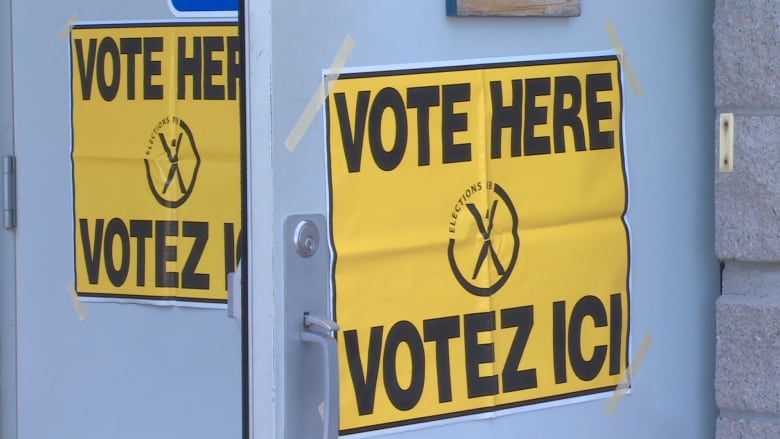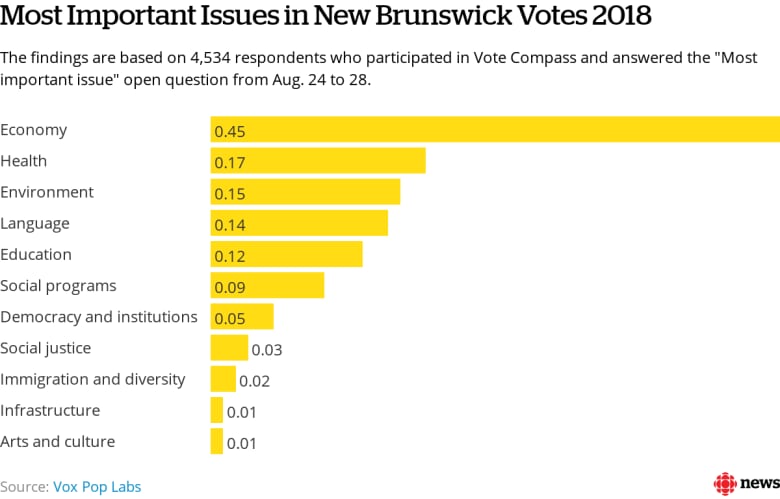Economy 'most important issue' for voters, Vote Compass data suggests
Here's a breakdown of top issues for respondents categorized by age, sex and education

Issues related to the economy are far and away the most important to New Brunswick voters, more than 4,500 responses to CBC's Vote Compass online tool suggest.
Regardlessof how you slice it by age, sex, language, education, party support the majority of those responding during the early stages of the New Brunswick election campaign say their most pressing concerns revolve around the economy, government spending, taxes and provincial budgets.
Data pulled from the Vote Compass feature, an online tool that indicates how your views compare to the political parties, offers a glimpse into which issues may drive voters to the polling station and which ones are further down the priority list.
Respondents were asked to input their most important political issue. Here's what they had to say:

The number of overall responses related to the economy were more than double those related to health care, the second most important issue. The finding isn't all that surprising since the province's struggling economy has been a source of debate since the last election.
New Brunswick's GDP is increasing but at the slowest rate of any Canadian province.
Opposition parties have harped on a string of deficits and ballooning debt during the Liberals' four years in office, while the fringe parties note the Tories haven't fared any better previously.
The Brian Gallant government transformed a projected $191-million deficit into $67-million surplus for the 2017-18 fiscal year a feat that was announced 48 hours before the official launch of the campaign.
Barring another remarkable about-face, however, the surplus will be short-lived with a $187.3-million deficit projected for 2018-19.
The responses suggests health care, the environment, language and education are secondary issues, while subjects such as infrastructure, arts and culture, and immigration and diversity barely moved the needle.
Have you tried out the Vote Compass feature?
Breakdown by party
Roughly 70 per cent of respondents who intend to vote Progressive Conservative say the economy is top of mind. Next in line is education at about 10 per cent.
No single issue resonates as strongly with the other parties, butcertain topics appear to fuel support for the Green Party and People's Alliance.
Unsurprisingly, nearly half of the respondents who intend to vote Green say the environment is their most pressing political issue. Other notable responses include the economy (about 25 per cent) and health care (more than 10 per cent).
Language is a huge issue for People's Alliance supporters. More than 40 per cent of them say issues surrounding the French language, duality and bilingualism should be paramount in the election.

This wouldn't be news tothe party leader, Kris Austin, who is campaigning on ending duality by combining anglophone and francophone public services.
Issues near and dear to Liberal and NDP voters are more varied.
The economy is top of the list for Liberal respondents, followed by health, education and the environment.
For the NDP faithful, the economy and health care are neck and neck, followed by the environment and social programs.
The age divide
The economy is the top priority for respondents of all ages, but a larger share of the 35 and over crowd view it as the number one political issue nearly half of the 35-54 and 55-plus groups compared with 37 per cent of the 18-34 category.
Things differ from there.
After the economy, health care is the main issue for respondents 55 years and up, at 22 per cent. Next is a tie with environment and language, at 13 per cent and then education at nine per cent.
For the 35-54 group, language issues, health care and the environment are in a close race behind the economy at around 15 per cent. And for the youngest category, the environment is second on their list at 19 per cent and then education and language at 15 and 12 per cent, respectively.
Youngervoters are also concerned with issues not on the radar of the older respondents, including social programs, immigration and diversity as well as social justice.
Other nuggets
Both male and female respondents agree the economy is the primary concern, although more so men, by more than 20 percentage points. Fifty-seven per cent of men said it's the top issue compared to 34 per cent of women.
The data suggests other key areas, such as health care, the environment, language and social programs, are in the minds of more female respondents.
There's little variation in responses among different levels of education. Respondents with university degrees, college or trade school and high school or below tend to agree on most issues except for one: language.
Seventeen per cent of respondents with college or trade school and 15 per cent of respondents with high school or less say language is their main concern this election campaign. Just eight per cent of university graduates who responded say the same.
A note on methodology
Developed by a team of social and statistical scientists from Vox Pop Labs, Vote Compass is a civic engagement application offered in New Brunswick exclusively by CBC and Radio-Canada.
The findings are based on 4,534 responseswho participated in Vote Compass and answered the "Most important issue" open question from Aug. 24, 2018, to Aug. 28, 2018.
Unlike online opinion polls, respondents to Vote Compass are not pre-selected. Similar to opinion polls, however, the data is a non-random sample from the population and has been weighted in order to approximate a representative sample.
Vote Compass data has been weighted by gender, age, education and country of birth to ensure the sample's composition reflects that of the actual population of New Brunswick, according to census data and other population estimates.














_(720p).jpg)


 OFFICIAL HD MUSIC VIDEO.jpg)
.jpg)



























































































